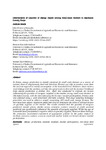| dc.description.abstract | In Kenya, mango production is mainly practiced by small-scale farmers as a source of income, form of employment, food and nutrition. Farmers are able to produce more than the amount required to satisfy consumption at the household level. However, there exists a weak linkage with the markets, and thus the opportunity to diversify the farmers’ livelihood from mango production is limited. This study was conducted to evaluate the factors influencing the quantity of mangoes supplied to the market among small-scale farmers in Machakos County, with the aim enhancing the farmers’ market participation. Primary data was obtained using a semi-structured interview schedule. Two-stage sampling technique procedure was used to obtain a sample comprising 352 small-scale mango farmers. The two-stage least square regression model was used to determine the effect of selected factors on quantity supplied to the market. The results revealed that the quantity of mangoes produced, market prices, market access, extension contact, amount of credit accessed positively and significantly influenced the quantity of mangoes supplied. While the age of household head precipitated a negative effect on quantity supplied. Based on these findings, the researcher recommend enactment of appropriate policies by the policy makers to facilitate extension contact, access to credit and market outlets to enhance farmers' market participation. | en_US |

